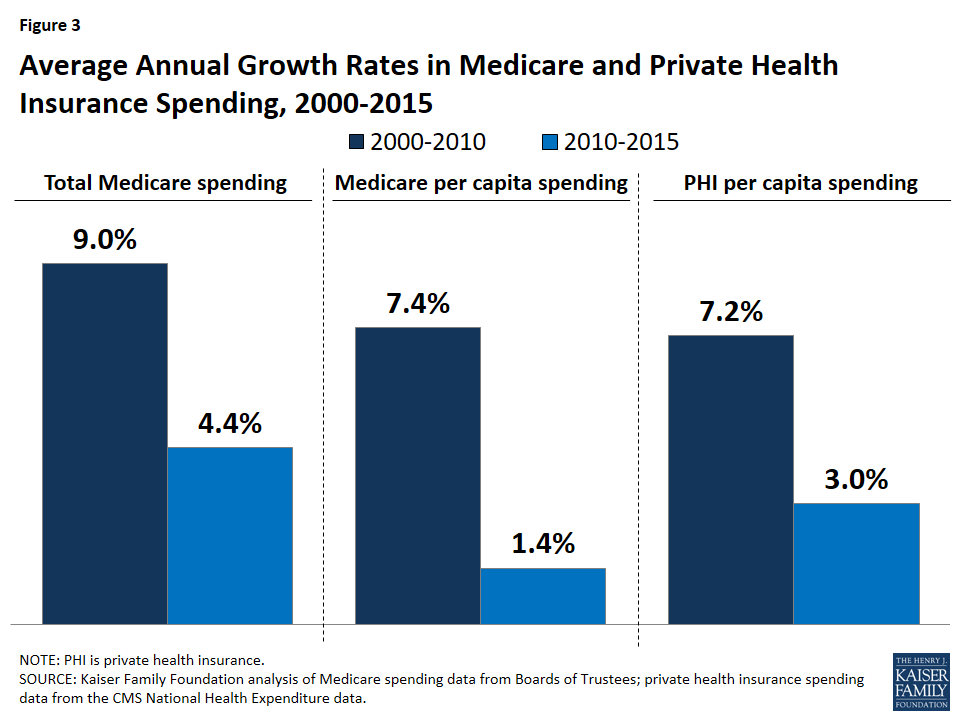Join Us Live for a Discussion on Medicare, Democracy, and the Future of Health Care
Kaiser Family Foundation Releases Facts on Medicare Spending and Financing

According to a new issue brief by the Kaiser Family Foundation (KFF), the growth in total Medicare spending between 2010 and 2015 (4.4 percent) was notably lower than spending between 2000 and 2010 (9 percent). Even more remarkable, spending in the Medicare program has slowed even as enrollment in Medicare since 2011 has increased with baby boomers becoming eligible. Additionally, the average growth in spending per beneficiary each year was only 1.4 percent between 2010 and 2015, which is considerably lower than average spending growth of 7.4 percent between 2000 and 2010.
Medicare currently provides health insurance to 57 million older adults and people with disabilities. The Medicare program accounted for 15 percent of the federal budget in 2015. In 2014, 20 percent of total U.S. health care spending, 29 percent of spending on retail prescription drugs, 26 percent of spending on hospital care, and 23 percent of spending on physician services was in the Medicare program. In total, the Medicare benefit made $632 billion in payments in 2015, with 27 percent going to Medicare Advantage plans to cover Part A and B benefits for their enrollees, 23 percent for hospital inpatient services, 12 percent for Part D prescription drugs, and 11 percent for physician payments.
While Medicare spending has slowed in recent years, and is expected to slow even more in the future compared to historical levels, KFF points out signs that, “…spending growth could increase at a faster rate than in recent years, in part due to rising prescription drug spending, growing enrollment in Medicare, increases in provider payments, and higher growth in input prices for medical care.” Furthermore, there are signs that total Medicare spending and spending per beneficiary could slightly increase above the historically low levels seen in recent years. For KFF, this raises certain questions, including:
- “Can the recent slowdown in Medicare spending be sustained and can this be done without adversely affecting access to or quality of care?”
- “How are payment and delivery system reforms influencing spending levels?”
- “How will future spending be affected by Medicare’s new approaches to physician payment that will be established pursuant to the 2015 law known as MACRA?”
- “What steps could be taken to moderate the projected growth in Medicare spending due to the availability of new specialty drugs and medical technology?”
Various policies have been proposed to target potential increases in Medicare spending by restructuring the Medicare benefit and cost sharing. Additional policies have also been proposed to improve Medicare coverage in order to decrease the financial burden of health care costs on people with Medicare. According to KFF, “The prospects for these and other proposals that would affect Medicare spending and financing are unknown, but few would question the importance of carefully deliberating ways to bolster the Medicare program for today’s beneficiaries and for the growing number of people who will depend on Medicare in the future.”
Show Comments
We welcome thoughtful, respectful discussion on our website. To maintain a safe and constructive environment, comments that include profanity or violent, threatening language will be hidden. We may ban commentors who repeatedly cross these guidelines.
Help Us Protect & Strengthen Medicare
Donate today and make a lasting impact
More than 67 million people rely on Medicare—but many still face barriers to the care they need. With your support, we provide free, unbiased help to people navigating Medicare and work across the country with federal and state advocates to protect Medicare’s future and address the needs of those it serves.
The Latest
Most Read
Add Medicare to Your Inbox
Sign up to receive Medicare news, policy developments, and other useful updates from the Medicare Rights.
View this profile on InstagramMedicare Rights Center (@medicarerights) • Instagram photos and videos









